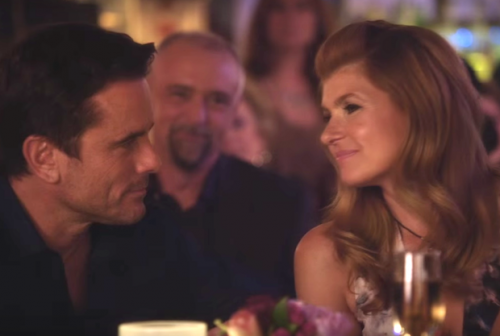The TV Room: Nashville Season 4, by David Bax
Even in the age of “peak TV,” when there are hours on end of noteworthy television every night of the week (and twice on Sundays), there is a particular, once-thriving subgenre that’s become increasingly hard to find: The old-fashioned primetime soap opera. I’m not talking about the shows of the Shondaland variety that are so exaggerated as to be a kind of postmodern melodrama. Nor am I talking about self-aware, high-concept shows like Jane the Virgin. Those series are great and people love them, as they should. But the classical middle ground is quickly disappearing. With the critically acclaimed Parenthood off the air and the still-breathing Mistresses taking up Summer airtime, the recent cancellation of ABC’s Nashville signaled another major move toward dormancy for the traditional evening soap.
Nashville was ostensibly about the heart of the contemporary country music scene in its flagship city. Its two pillars were Rayna James (Connie Britton), a darling of the country music world with twenty years of professional experience and respect under her belt, and Juliette Barnes, an up and coming, pop-infused sensation made of raw ambition. Around them fluttered lovers, family, songwriters, managers, assistants, sycophants and those with their eyes on the throne. The show was as much about music as it was about who was in love, who was lying, who was cheating and who covered up the accidental death of their manager and let everyone believe it was a suicide. Honestly, the body count on Nashville may not rival Scandal’s but the show racked up a pretty impressive score over the years.
That’s not quite how things started out, though. Nashville’s earliest episodes were critical darlings and the series aimed for resonance in mirroring the changing realities of the country music world—with Juliette a clear stand-in for Taylor Swift—as well as an ambitious grounding in the politics of the city itself.
It became clear the latter element was of dwindling interest to the writers as the stories went on, with the mayor doing less and less mayoring. And, after treading water at the end of its first season and the beginning of its second, the former storyline expanded and diluted until all of the show’s regular characters were essentially part of the same in-group. It started to seem as if all of country music’s hits were being written and recorded by the same group of ten or so people. That may have signaled an abandonment of the series’ initial mission statement but it upped both the opportunities and the stakes for interpersonal drama.
One of Nashville’s defining characteristics, of course, was the music itself. The characters all wrote and performed original songs, provided mostly by working songwriters from the titular city, where the show was filmed for its entire run. There were multiple songs in every episode and a surprising number of them were pretty darn good; I can still hum from memory many of the numbers from season one. The allegiance to this part of the show made it more complicated to produce but also arguably made it more profitable, with songs available to purchase on iTunes after each episode aired. This was a model that kept Glee well in the black, which was the clear inspiration.
Maybe the series’ debuting with the glow of a more prestigious drama is what caused some to refuse to take it seriously as it changed. The accolades slipped its grasp and many viewers turned away. It tried to make big splashes with moments like Scarlett’s (Clare Bowen) onstage meltdown complete with visions of her cruel and taunting mother or Peggy’s (Kimberly Williams-Paisley) faked miscarriage with pig’s blood. But the show kept its core fans (like me) by staying largely true to its characters, no matter how inane the narratives could be. Like with most great television shows, it was peopled with folks you were happy to invite into your living room every week, whether they were denying their obvious love for one another or blackmailing major stars for an opening slot on a tour. They could be exasperating but they were a fun hang. And, oh yeah, Juliette and Avery forever.































This is just speculation, but I believe Nashville is also responsible for the end of Hey, Watch This… as we know it.
I was hoping this show would at least continue long enough for the universe to stop shitting on Layla Grant. Alas, that poor girl is doomed to float forever in the ether of cancellation, wondering why she didn’t just go to Harvard instead.